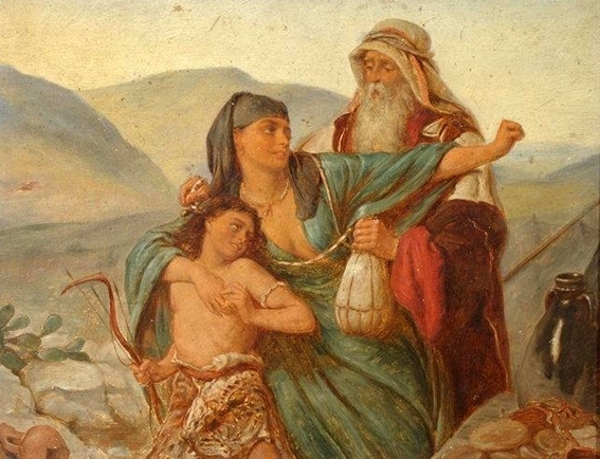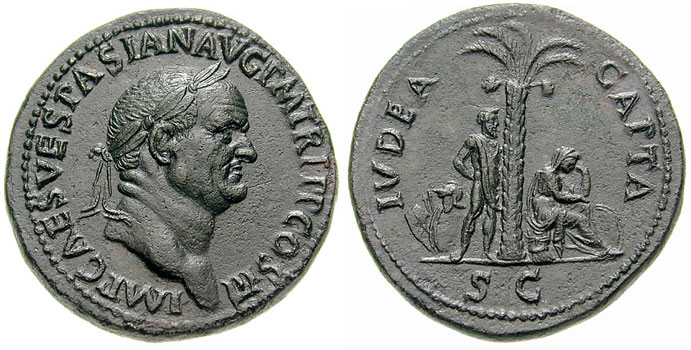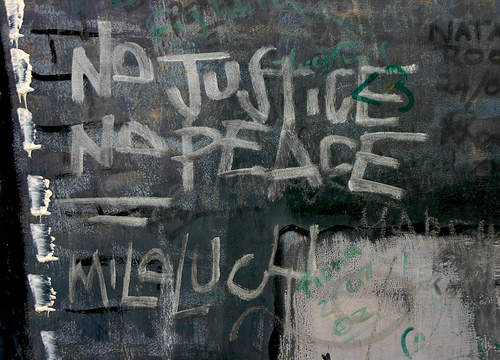Proper 7-A; June
22, 2014
Genesis
21:8-21
Psalm 86:1-10, 16-17
Matthew
10:24-39
Because of his wife’s jealousy of the “other woman,” Abraham
casts his first-born son into the wilderness to die. Hagar, the Egyptian slave
woman who is the child's mother, has run out of food and water. She lays the
exhausted, parched and famished boy under a bush, and says, to no one, for
there is no witness to this act, "Do not let me look on the death of the
child." She then cries aloud and weeps.
This could be a scene from South Sudan, from the Mexican
border, from Syria, or from countless desperate places on our planet today,
where mothers and children are abandoned by family, by warring governments, by
economic forces beyond their control, and sent out to many kinds of wilderness
to die. Friday was World Refugee Day, and a good thing, too, because I hear
that today there are more refugees than at any time since the end of the Second
World War.
If the day's Gospel lesson reflects Jesus’ “family values,”
it does not fare much better. "I have come to set a man against his
father, and a daughter against her mother, and a daughter-in-law against her
mother-in-law." Jesus declares. "One's foes will be members of one's
own household. Whoever loves father or mother more than me is not worthy of
me."
This passage comes from a section in the Gospel of Matthew
concerning discipleship: what does it mean to follow Jesus? What would it look
like in my life, the disciples are asking themselves, to take part in the
breaking in of this kingdom of heaven? What does it mean to take up my cross,
to lose my life, to understand God not as the bringer of peace but as the
wielder of a sword?
As important as family is to us today, our modern ears
cannot hear it quite the same way as Jesus’ followers would have. We moderns
are all about “ME,” about self-actualization and self-realization. We strike
out on our own, we value independence and self-reliance: the Lone Ranger, the
pioneer on the frontier, the corporate raider, the “Army of One.” But in the
world in which Jesus lived, you were not an individual apart from your family.
Your family gave you your identity, gave you not just your name but your place
in the community and in the world, and your family protected you from that world.
Your family was a good thing, a precious thing; you didn’t just strike out on
your own. Jesus isn’t some 1960s hippie cult leader telling you to tune in,
turn on, drop out, from a family that oppresses, abuses or bores you.
There were plenty of bad things in first century Palestine,
plenty of things that Jesus might exhort you to leave behind, but the family
was not one of them. The Romans were bad, because they were an occupying army
in your homeland. The temple authorities were bad, because they colluded with
the Romans in exchange for privilege and protection. The civil bureaucracy was
bad, because it taxed the people nearly to death. Indeed, death and fear were
the operative social norms. The family was the refuge from all that. No one
could survive without a family.
So when Jesus says, “Follow me,” he is asking the disciples
to leave behind one of the few institutions in society that works. Jesus’ call
upsets every apple cart there is, and then he says, don’t worry. Don’t be
anxious. Consider the lilies, remember the sparrows. The kingdom of heaven
means the whole world is about to be re-ordered. Everything will be uncovered.
There will be no more secrets, no more power brokers, or back-room deals. This
news is so good that it must be shouted from the rooftops – no matter what the
consequences. No matter how many authorities you anger, no matter how many
armies they unleash. God’s kingdom HAS to challenge this kingdom, and even the
blessed and good family, the loving parents, the bonds of affection and kinship
– even these can get in the way of this truth of God which cuts like a sword.
The new thing which God is doing is even deeper, even more important, even more
powerful that the deepest, most important and most powerful parts of our lives,
the parts of our lives that make us most truly human. God is a sword which
pares away even our relationships, our kinships, our families.
Where is God taking us with this confusing, and maybe even
terrifying, lesson? Is discipleship some sort of desert wilderness? Are we
called to be like Hagar and Ishmael, stumbling around until the water runs out,
cut off from family and security and hope and the future?
 Look again at this astounding story of Hagar and Ishmael –
and God. Even though God has apparently blessed the dismissal of the two into
the wilderness, God will not let them suffer. The voice of the angel of God
raises Hagar’s hopes, and promises that even this discarded son of Abraham will
be the father of many nations. Even these two hopeless creatures, these outcasts
and discards, this tiny remnant of a broken family will have a great future in
store. Abraham may have cast out Ishmael but God stayed with him.
Look again at this astounding story of Hagar and Ishmael –
and God. Even though God has apparently blessed the dismissal of the two into
the wilderness, God will not let them suffer. The voice of the angel of God
raises Hagar’s hopes, and promises that even this discarded son of Abraham will
be the father of many nations. Even these two hopeless creatures, these outcasts
and discards, this tiny remnant of a broken family will have a great future in
store. Abraham may have cast out Ishmael but God stayed with him.
If Jesus calls us as disciples to turn away from even the
good parts of our lives, if they distract and keep us from the gospel, it is
because being a disciple leads us into so much more. We see this broken world
now as Jesus sees it. Freed from our own particularity, we can act as perhaps
Jesus would have us act. We can even take our families with us. We can see the
Hagars and Ishmaels of today, in the countless desert places, the violent
streets, the lonely corners. We can resolve to be that angel of God who shouts
from the rooftops that it doesn’t have to be this way, the angel who brings
God’s gifts of water, sustenance and hope to a world that too often cries in
despair.
Proper 29 C Nov.
24, 2013
Jeremiah 23:1-6
Canticle 16 – Luke
1:68-79
Colossians 1:11-20
Luke
23:33-43
 One of the founding stories of our democracy is “no taxation
without representation.” It is hard indeed, after all these years, built on
stories like that, to get our American heads around the Sunday of “Christ the
King.” Many Christians now call this day “the Reign of Christ,” which seems to
downplay the patriarchal tint to the word “king,” but the monarchy is still
there: we small-d democrats and small-r republicans have no intention of living
under anybody’s “reign” – monarchs reign; in a democracy, our leaders govern
with the consent of the people. We are citizens, not subjects, and even at
times like this, when our democracy seems a little bit lumpy and not working as
well as we would like, we’re not going back to be under anybody’s “reign.”
One of the founding stories of our democracy is “no taxation
without representation.” It is hard indeed, after all these years, built on
stories like that, to get our American heads around the Sunday of “Christ the
King.” Many Christians now call this day “the Reign of Christ,” which seems to
downplay the patriarchal tint to the word “king,” but the monarchy is still
there: we small-d democrats and small-r republicans have no intention of living
under anybody’s “reign” – monarchs reign; in a democracy, our leaders govern
with the consent of the people. We are citizens, not subjects, and even at
times like this, when our democracy seems a little bit lumpy and not working as
well as we would like, we’re not going back to be under anybody’s “reign.”
Yet our most frequently used prayer goes like this: “Thy
kingdom come. Thy will be done, on earth as it is in heaven. Give us this day
our daily bread, and lead us not into temptation.” No matter what our system of
government is, apparently the best way we can describe what the world should be
like is that it is under the reign of God – a reign under which all basic human
needs, like that of daily bread, are met, where “structures of domination and
subjugation [are] overcome… [where] all dwell in harmony with God and each
other[i]”
beyond the temptation and corruption of evil.
If we Americans live in a democracy, yet with this memory of
monarchy, the people of Jesus’ day found themselves living in an unjust
monarchy, yet with a memory of democracy – or at least of republican
government. They remembered the rule of law. They remembered when their
wretched taxes did not go to support an imperial military force that imposed
order whether it was lawful or not. The days of Caesar Augustus, as the
evangelist Luke is so keenly aware, are the days of the first emperor, the
emperor who wrenched power from the elected consuls, now no more than the shell
of republicanism. “All the world is at peace,” Caesar declared. “First victory,
then peace.” The people longed for order and for peace. They longed for a
society in which they could safely earn their daily bread, a society which kept
at bay for the forces of chaos and disruption. But under the emperor, who
needed all those rumors of war to stay in business, peace came from a permanent
military. Peace came at the price of crippling and permanent taxation from
which there was no hope of relief. Peace came at the price of the erosion of
the rule of law. Peace came at the price of justice.
The Jesus mocked as “the king of the Jews” has no power to
impose anything like the peace and order of the Roman Empire. By the time this
Gospel is written, decades after anyone alive had witnessed that crucifixion,
people were beginning to understand what this “reign of God” meant – what this
alternative kingship was about. Jesus went to his death talking about a
different kind of world order. In his life and in his death, Jesus ‘[grappled]
with the disorders of injustice, suffering and death. The darkness of death,”
writes Biblical scholar Walter Brueggemann, is pushed back one emergency at a
time.” Over the course of his life and in the manner of his death, Jesus
demonstrated to ordinary people – like us – that he knew just what they were
going through, that he stood with them, and us, and that most importantly he
WITHstood the worst that lawlessness and chaos could dish out.
People knew that Luke wrote the truth about Jesus. They knew
it because the people who stood up for
them, and with them – the people who
were willing to go to their deaths in place of them, were the people who
believed in this upside-down kingship of Jesus. The people of Luke’s day knew
they could pray to the Emperor all they wanted, but there was no bread without
justice, no peace without justice. The imperial army could be powerful and
rich, but the people still suffered from want and lived in fear. The people of
Luke’s day began to follow “the servants of this new king. [These]
practitioners of this newly ordered world” took their leadership public. When
Luke told this story of standing at the foot of the cross, of hearing in Jesus’
last words that he was still turning the world around, it gave people courage that
they could do that too, in their own day and in the face of their own
challenges.
This day of Christ the King is for us, citizens and subjects
alike.
[i]
Rosemary Radford Ruether, in Sexism and
God-Talk, quoted by Suzanne Guthrie in http://www.edgeofenclosure.org/reignofchristc.html



